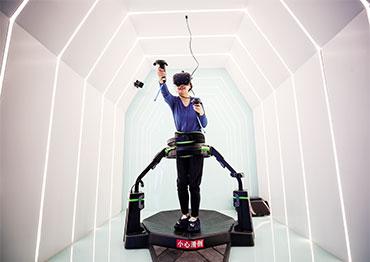According to Liu Zejing, the metaverse, judging by its content data, is at a preliminary conceptual phase, since VR is dependent on highquality content or it will shed users. “I don’t think price is the major factor that influences whether people buy. Good user experience and high-quality content are more important,” he said.
Many players have already experienced a metaverse-like world. The American game Second Life, which launched in 2003, enables players to work, do business, establish relationships and get married. Many enterprises, including Toyota Motor, GE, Adidas and IBM developed commercial property in the game and the Swedish Institute, a body responsible for popularizing Sweden’s image, even set up an embassy.
In China, many role-playing games supported virtual marriage and sales of virtual items years ago, and some Chinese online novels describe an audacious metaverse world where players can feel pain if they are attacked by monsters or other players and can exchange virtual game currencies for real currencies.
This, however, is not allowed in the real world, as the Chinese government banned cryptocurrency exchange in games. Developers and players cannot set up virtual banks in any game.
Virtual banks caused big trouble in Second Life when some players refused to pay their customers, who vociferously complained. The developer, San Francisco-based Linden Lab, closed more than 10 virtual banks, only to find many players could not withdraw their virtual money. According to a report by IT Time Weekly, customers of one virtual bank lost a combined US$750,000. Linden Lab eventually banned virtual banks without a real government registration or permit.
This indicates a predicament for the metaverse – how to supervise and deal with disputes when the virtual world combines and interacts with the real one.
“A metaverse world should operate under a complete set of social rules, including laws, regulations and moral values, as well as economic, currency and cultural systems... No company now has the experience to do such a thing. It actually can’t be done by one company alone, since the metaverse requires intensive participation of all the enterprises on the industrial chain, rather than one company’s game,” Ji Zhihui, founder of 4U Technology, a Beijing-based VR/AR company, told NewsChina.
Wang agrees, saying the development of the metaverse cannot operate without oversight and governance of a real country. “On one hand, some countries want to promote the development of the metaverse. On the other, the metaverse’s spirit [of decentralization] is contradictory to a sovereign country,” he said.
For example, a metaverse world is supported by digital currencies and an economic platform based on blockchain, while countries have different regulations on managing digital currencies.
On October 14, the People’s Bank of China issued a document that tightens supervision of virtual currencies. It states that any business related to virtual currency is illegal in China and no overseas virtual currency exchange is allowed to provide services to domestic Chinese citizens.
The Tsinghua metaverse report warned that the metaverse might provide a hidden space for illegal financing and suggested financial supervision should extend to the virtual world to prevent risk as in Second Life. This means that a central authority or governing body must supervise such activity, which goes against the spirit of the metaverse. That is why the Tsinghua report believes it is a pseudo-proposition for the metaverse to advocate “complete decentralization.”
Intellectual property is another obstacle, according to analysts.
“A metaverse needs a lot of collaboration by a large number of users, so it needs to [properly] confirm and protect collective intellectual property, which is difficult when some applications are across the virtual and real worlds. For example, has a user infringed on IP if they adapt or transfer other people or scenes or stories from the real world into the virtual world?” Xiang asked.
Xiang further warned that the metaverse involves the collection and storage of more detailed personal information, including physiological reactions, behaviors, social relationships, emotional states and brain patterns. It is a tremendous challenge to store, supervise and manage that information to prevent crimes.

 Old Version
Old Version


